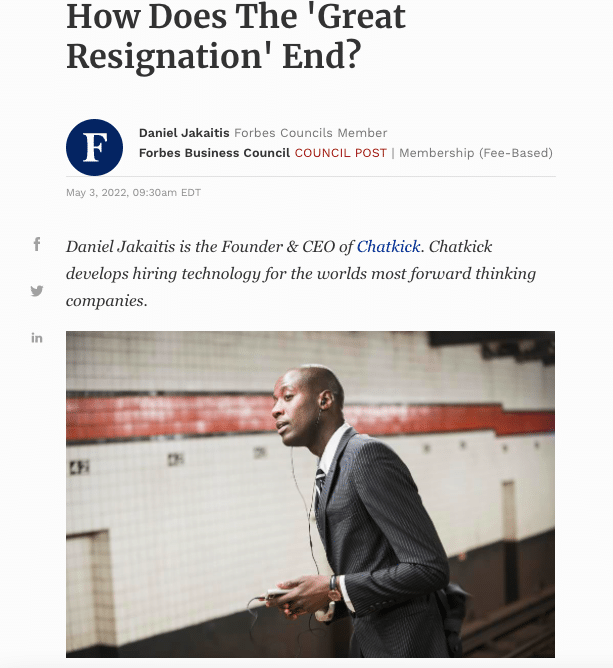I would argue that Tech has always been the “flightiest” industry in terms of retention; employees tend to know their value, they are tech savvy (and therefore check their LinkedIn DMs and virtual job postings frequently) and have highly sought out, transferable skills that can elevate a broad range of various SaaS platforms. But after the pandemic began in 2019, Tech is no longer the only industry with high rates of turnover. I find “The Great Resignation” to be most interesting because it has not only taken the tech field by storm but all industries across the globe.

Forbes posted a great article yesterday describing the current numbers around companies’ resignation and retention rates of which I will highlight now:
“The way we work has drastically transformed in the last few years. Teams can now hire anyone from nearly anywhere. With less need for expensive office spaces, lavish events or transportation, companies have opened their purse strings to the new realities of today’s labor market.
But in November 2021, a record 4.5 million workers left their jobs, and according to a survey by Joblist, three out of four full-time employees plan to quit their job this year.
Current unemployment rates are near an all-time low of 3.8%, but in February 2022, there were over eleven million unfilled positions in the U.S., the largest number ever recorded.”
Forbes then dives into the six trends that will potentially change the trajectory of high resignation rates and increase employee retention once again. Let’s take a look:
- Streamlined Internal Processes
Forbes discusses the need for smart and efficient ways of filling roles. Two examples of this are:
- Engage your current employees more by expanding your internal referral process and compensation
- Invest in a hiring platform to remain organized and put less stress on multiple team members and their schedules to be involved in the hiring process
- Simplified Global Payroll
US companies are offering higher salaries along with other perks due to the competitive demand nature of the current market. For the smaller companies who can’t afford to keep up, many companies are “going global” and hiring for roles from lower-cost areas of the world, instead of strictly from the US.
- Making Remote Work Feel Like In-Person Work
Having your workforce be fully remote can ruin morale if coworkers don’t feel that sense of comradery that they did in the office. Forbes believes that The Metaverse will be a great way for employees to “hang out” while still remaining remote.
- More Effective Human Capital Management
Retaining and promoting from within is much more cost effective than hiring and training new employees. It’s important to have a solidified “ladder” for your employees to climb in terms of how they can achieve career growth within the company.
- Inevitability Of Business Cycles
Rising interest rates will affect how startups can compensate their employees – specifically with equity due to inflation taking its toll on valuations.
- Return To The Office
Many companies will lose employees after requiring them to return to the office after successfully weathering two years of remote work.
Conclusion
I found Forbes’ article to be both insightful and interesting. If the pandemic has taught us anything, it is that perhaps work is not the end-all be-all and we should take a look at how much our time is really worth when weighed against spending time with our families and friends; because the things and people that matter could be taken away sooner than we could have ever expected. Choose how you spend your time wisely and spend it working for a great company that values you, your time and your skillset.





